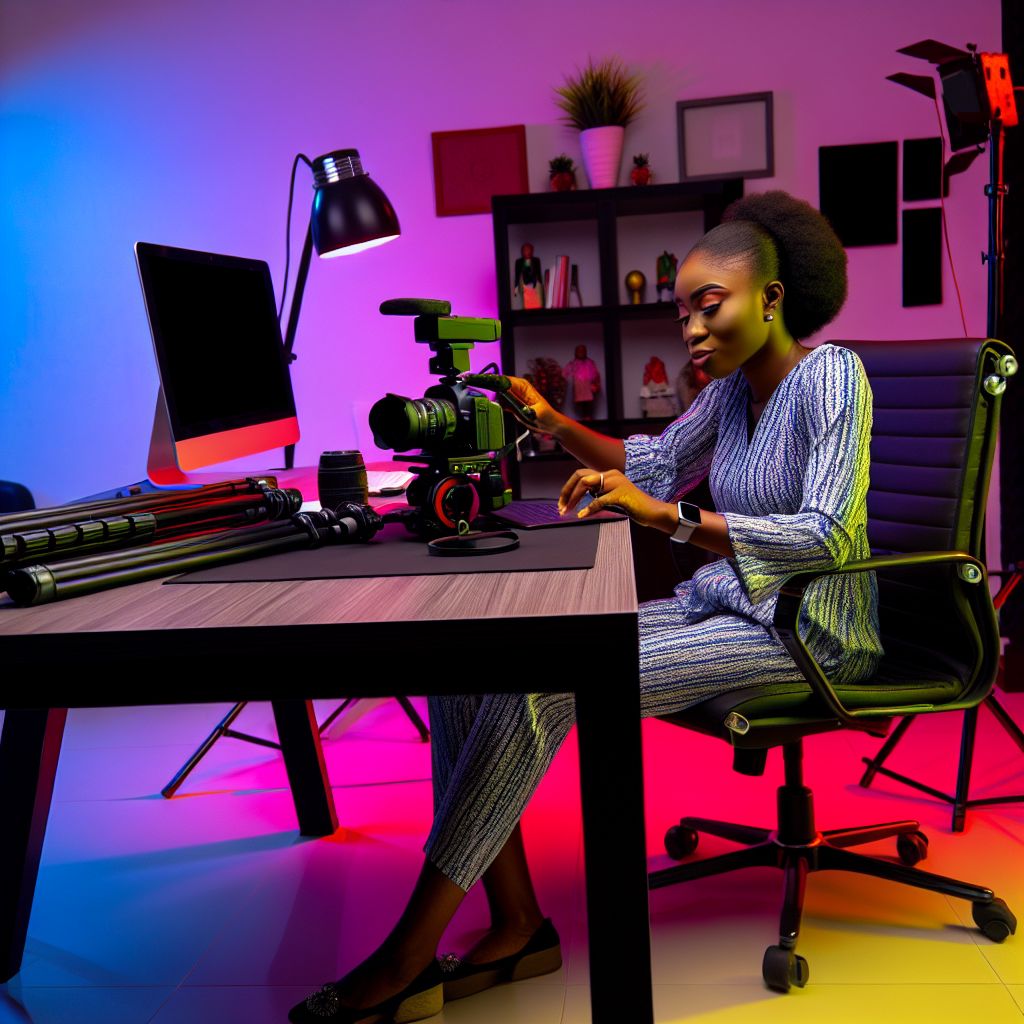Introduction to Video Content
Growing Popularity of Video in Nigeria
Video content captures attention quickly and effectively.
It has become a dominant form of communication worldwide.
In Nigeria, increasing internet access boosts video consumption.
Social media platforms like Instagram and TikTok enhance video sharing.
Moreover, smartphone usage supports easy video creation and viewing.
Importance of Video in Digital Marketing
Marketers leverage video to engage Nigerian audiences more deeply.
Videos explain products and services in a clear, memorable way.
They improve brand visibility and increase customer trust.
Hence, businesses using video often see higher conversion rates.
Advantages of Using Video Content
Video content caters to different learning styles and preferences.
It encourages emotional connections between brands and customers.
Furthermore, videos are easily shareable, amplifying reach organically.
They also improve search engine rankings when optimized properly.
Trends Shaping Video Marketing in Nigeria
Live streaming gains popularity for real-time audience interactions.
Short-form videos dominate due to mobile user behavior.
Personalized Financial Consulting – Tailored for You
Get a custom financial plan made just for you in 1-3 days. Clear strategies, actionable steps, and unlimited revisions.
Get StartedLocal influencers create relatable content that resonates with Nigerians.
Additionally, animation and storytelling enrich brand narratives.
Overview of the Nigerian Digital Landscape and Internet Penetration Rates
Growth of Digital Connectivity in Nigeria
Nigeria experiences rapid growth in digital connectivity across urban and rural areas.
Mobile technology plays a crucial role in expanding internet access nationwide.
Moreover, affordable smartphones have boosted online engagement among young Nigerians.
Telecom companies like MTN Nigeria and Airtel continue to enhance network coverage.
Consequently, the digital ecosystem becomes more vibrant and competitive.
Internet Penetration and Usage Patterns
The country’s internet penetration rate surpasses 50%, reflecting widespread adoption.
Social media platforms such as Instagram, Facebook, and TikTok attract millions of users.
Additionally, streaming services gain popularity, encouraging video content consumption.
Urban centers like Lagos and Abuja lead with the highest connectivity rates.
However, rural areas still face challenges like inconsistent power supply and infrastructure.
Digital Economy and Its Potential
The Nigerian digital economy contributes significantly to national GDP growth.
Startups focused on e-commerce, fintech, and digital marketing thrive in this environment.
Unlock Your Path to Financial Freedom
Personalized savings and investment strategies tailored to your financial goals. Let's help you take control of your future with a plan designed just for you.
Get StartedEntrepreneurs leverage online platforms to reach wider audiences effectively.
Government initiatives aim to improve digital literacy and internet access nationwide.
Therefore, the digital landscape forms a critical foundation for marketing innovations.
How Video Content Enhances Brand Awareness and Engagement Among Nigerian Audiences
Capturing Attention with Visual Storytelling
Video content uses compelling visuals to capture Nigerian audiences effectively.
It creates emotional connections through relatable stories and authentic experiences.
Moreover, videos simplify complex messages, making them easier to understand.
For instance, Lagos-based Sapphire Media shares inspiring client journeys via video.
Thus, video storytelling instantly attracts and retains viewer attention nationwide.
Boosting Brand Visibility Across Digital Platforms
Videos perform well on social media platforms popular in Nigeria, like Instagram and TikTok.
Consequently, brands like Nyoka Solutions have increased their reach through dynamic videos.
Additionally, video content ranks higher on search engines, improving brand discoverability.
Many Nigerian consumers prefer watching product demos over reading descriptions.
Therefore, videos help brands appear prominently and engage potential customers online.
Enhancing Engagement Through Interactive and Shareable Content
Video encourages interaction by prompting likes, comments, and shares among viewers.
Take Control of Your Debt Today
Struggling with debt? Get personalized strategies to pay off your debts, negotiate with creditors, and rebuild your credit. Your path to financial freedom starts here.
Get HelpSocial media users, particularly younger Nigerians, eagerly share engaging video clips.
This sharing amplifies brand messages organically across diverse community networks.
Furthermore, brands such as Enugu’s Prime Ventures host live sessions to boost real-time engagement.
Hence, video content fosters stronger, two-way communication with Nigerian audiences.
Building Trust and Credibility with Authentic Presentations
Videos present products and services transparently, building consumer trust quickly.
Well-produced testimonials and behind-the-scenes clips validate brand authenticity.
For example, Abuja’s Roots Digital Agency showcases client success stories via video.
Such authentic portrayals resonate with Nigerian viewers seeking credible brands.
As a result, videos enhance brand loyalty and positive reputation throughout Nigeria.
Adapting to Mobile-First Consumption Habits
Most Nigerians access online content through smartphones, favoring mobile-friendly videos.
Short, engaging clips loaded quickly match fast-paced mobile browsing behaviors.
Brands like Jos-based Zoom Media optimize their videos for seamless mobile viewing.
Hence, video content aligns perfectly with Nigeria’s mobile-driven digital landscape.
This adaptation further amplifies brand awareness and audience engagement effectively.
You Might Also Like: How Influencer Marketing Drives Results for Nigerian Businesses
The Effectiveness of Video Storytelling in Connecting with Diverse Nigerian Demographics
Reaching Nigeria’s Multicultural Audience
Nigeria’s population consists of over 250 ethnic groups.
Video storytelling effectively bridges cultural differences.
For example, Lagos-based media company Azoke Media tailors stories in Yoruba, Igbo, and Hausa.
Consequently, video content resonates better across linguistic divides.
This adaptive approach attracts viewers from various regions.
Engaging Different Age Groups
Younger Nigerians spend more time on social media platforms.
Video content on TikTok and Instagram engages this demographic creatively.
Meanwhile, older generations prefer YouTube and television broadcasts.
Video storytelling meets diverse preferences by varying style and length.
Thus, companies like BlueRiver Digital create both short clips and in-depth documentaries.
Appealing to Urban and Rural Audiences
Urban viewers appreciate high-quality, fast-paced video content.
Conversely, rural audiences seek relatable stories with local context.
VidConnect Nigeria produces videos spotlighting rural success stories.
This strategy fosters trust and loyalty among less urbanized communities.
Video’s visual nature helps overcome literacy barriers in rural areas.
Highlighting Social and Economic Issues
Video storytelling provides an emotional connection to social themes.
For instance, campaigns about education access gain momentum through shared stories.
Marketing firm Niax Communications uses video to highlight youth empowerment initiatives.
Through storytelling, brands demonstrate social responsibility.
As a result, audiences feel motivated to support these causes.
Building Emotional Connections Through Personal Stories
Authentic narratives travel deeper than traditional advertisements.
Video captures facial expressions, tone, and environment effectively.
Marketers like Chijioke Okafor leverage this to humanize brands.
Moreover, viewers identify with stories addressing their challenges and dreams.
This emotional engagement drives brand loyalty and advocacy.
Utilizing Local Influencers and Creators
Collaborating with Nigerian influencers enhances video content relevance.
Influencers add cultural context and local language nuances.
For example, singer and content creator Chima Obi partners with brands on video campaigns.
These collaborations increase trust and viewer retention.
Consequently, partnerships with local talent maximize audience reach.
Discover More: How Nigerians Are Leveraging Digital Marketing to Boost Their Incomes
Utilizing Social Media Platforms Popular in Nigeria for Video Marketing Campaigns
Leveraging Facebook for Broad Reach
Facebook remains one of the most widely used social media platforms in Nigeria.
Marketers should create engaging video content tailored to Facebook’s audience demographics.
Moreover, Facebook’s advanced targeting options allow precise audience segmentation.
Advertising on Facebook helps brands like LagosTech Solutions reach millions effectively.
Additionally, Facebook Live streams offer real-time audience interaction.
Maximizing Instagram’s Visual Appeal
Instagram attracts a younger, trend-savvy Nigerian audience.
Brands can use Instagram Stories and Reels to showcase dynamic video content.
For instance, NaijaFashion Hub posts short clips that boost engagement significantly.
Furthermore, partnerships with Nigerian influencers increase credibility and viewership.
Instagram’s algorithm favors consistent video posting to maintain visibility.
Exploring TikTok’s Explosive Growth
TikTok has rapidly gained popularity across Nigeria’s urban and rural areas.
The platform encourages creative, short-form videos with viral potential.
Creative agency Pulse Media produces vibrant TikTok campaigns that resonate locally.
Also, brands should utilize trending challenges to maximize exposure.
Regular posting on TikTok helps maintain audience interest and momentum.
Utilizing YouTube for Long-Form Video Content
YouTube remains Nigeria’s leading platform for longer and educational videos.
Companies like EcoGreen Nigeria produce tutorial videos that build customer trust.
Additionally, YouTube ads reach diverse audiences across regions and age groups.
Marketers must optimize video titles, descriptions, and thumbnails for better search results.
Cross-promoting YouTube videos on other social platforms increases overall reach.
Incorporating WhatsApp for Personalized Video Sharing
WhatsApp is widely used for direct communication in Nigeria.
Businesses can share video content directly to groups and broadcast lists.
For example, EkoFoods shares recipe videos tailored for various customer segments.
This method encourages word-of-mouth promotion and personal engagement.
Additionally, WhatsApp Status offers another effective video marketing opportunity.
Effective Video Marketing Strategies on Nigerian Social Platforms
Focus on culturally relevant themes and local languages in video content.
Use strong call-to-actions to guide viewers toward desired outcomes.
Ensure videos load quickly, considering internet connectivity challenges.
Analyze platform-specific metrics to optimize future campaigns.
Finally, collaborate with Nigerian creators and influencers to expand reach.
Explore Further: Unlock the Secrets of Digital Marketing to Create Multiple Income Streams
Cost-effectiveness and ROI of Video Marketing Compared to Traditional Advertising in Nigeria
Lower Production and Distribution Costs
Video marketing requires less financial investment than many traditional advertising methods.
Businesses like Omolara Ventures report reduced costs compared to TV or billboard campaigns.
Creating digital videos often needs only a smartphone and basic editing software.
Moreover, distributing video content through platforms like YouTube and Instagram is virtually free.
This affordability makes video marketing accessible to startups and small businesses in Nigeria.
Higher Engagement Leading to Better Returns
Video content naturally attracts more attention and keeps viewers engaged longer than text ads.
Marketing agency Lagos Media Hub found video campaigns yield a 30% higher engagement rate.
More engagement often translates into improved brand recall and conversion rates.
Consequently, businesses see stronger returns on investment from video marketing campaigns.
Local brands such as Tekmora Solutions have increased sales by leveraging engaging video content.
Measurable Performance and Targeting
Digital video marketing allows precise measurement of campaign performance in real-time.
Advertisers track views, clicks, shares, and conversions easily with analytic tools.
This data-driven approach enables continuous optimization to improve ROI.
In contrast, traditional media often lacks actionable feedback and precise targeting options.
For example, Abuja-based Media Metrics uses data insights to refine video advertisements quickly.
Flexible Budgeting and Scalability
Video marketing campaigns can start with modest budgets and scale as results improve.
Businesses control spending closely, avoiding large upfront costs typical of print or TV ads.
This flexibility suits the dynamic Nigerian market, where rapid adaptation is crucial.
Companies like BrightWave Nigeria scale their video outreach according to campaign success.
Therefore, video marketing provides cost control with the potential for exponential reach.
Advantages of Video Marketing for Nigerian Businesses
- Reduced production and distribution expenses.
- Increased viewer engagement and conversion rates.
- Access to detailed performance analytics for optimization.
- Budget flexibility that encourages efficient spending.
- Scalability aligned with business growth and market response.
Learn More: Master Advanced Digital Marketing Strategies to Grow Your Side Hustle in Nigeria

Challenges Faced by Nigerian Businesses in Producing and Distributing Video Content
Technical and Infrastructure Limitations
Nigerian businesses struggle with unstable power supply.
This instability affects video production schedules.
Limited access to high-speed internet hinders quick uploading of video content.
Sharing of video content suffers due to poor internet access.
Furthermore, the cost of reliable internet remains high for many small businesses.
Medium enterprises also face significant internet expenses.
These factors cause delays and reduce the overall quality of video campaigns.
High Production Costs
Producing high-quality videos demands significant financial investment in equipment.
Investment in software also adds to high production costs.
Hiring skilled videographers increases expenses considerably.
Employing professional editors further raises budget requirements.
Many businesses find it difficult to allocate enough budget for professional video content.
As a result, some businesses settle for lower quality videos.
Lower quality videos may not engage audiences well.
Limited Skills and Expertise
Many Nigerian companies lack trained personnel specialized in video production.
The shortage includes digital marketing expertise.
This shortage leads to inefficient content creation.
Poor storytelling techniques result from lack of expertise.
Moreover, understanding audience targeting through video remains complex.
Therefore, businesses often miss opportunities to maximize video impact.
Challenges in Content Distribution and Reach
Even after producing videos, distributing content effectively poses challenges.
Social media algorithms limit organic reach.
This limitation makes it hard for businesses to gain visibility.
Competing with large brands and influencers adds to distribution struggles.
Consequently, many videos fail to reach their intended Nigerian audience.
Compliance with Regulatory and Cultural Expectations
Nigerian businesses must navigate complex content regulations.
Failure to comply can lead to censorship or fines.
Cultural sensitivities require careful content crafting.
This care helps avoid offending potential customers.
The balancing act demands time and expertise.
Many businesses do not have these resources readily available.
Thus, some videos get rejected or fail to resonate with local audiences.
Effective Strategies to Address Production and Distribution Challenges
Investing in affordable training for in-house video production builds capacity effectively.
Collaborating with local creative agencies provides professional skills access.
This collaboration helps avoid exorbitant costs.
Utilizing mobile-friendly and low-data platforms improves distribution and engagement.
Finally, leveraging feedback from Nigerian consumers enhances cultural relevance.
Feedback ensures videos meet market expectations.
Case Studies of Successful Video Marketing Campaigns in Nigeria
Airtel Nigeria’s Interactive Campaign
Airtel Nigeria launched a video series titled “Stay Connected, Stay Inspired.”
The campaign featured real stories from Nigerians overcoming challenges using Airtel’s services.
It combined emotional storytelling with clear calls to action.
As a result, Airtel saw a significant increase in brand engagement.
Moreover, it boosted customer subscriptions across key markets.
Guinness Nigeria’s “Made of More” Campaign
Guinness Nigeria created inspiring video advertisements celebrating resilience and courage.
The videos showcased influential Nigerians from various professions.
They emphasized authenticity, linking the brand to national pride.
This approach resulted in high social media shares and conversations.
Consequently, Guinness strengthened its brand loyalty among younger consumers.
Flutterwave’s Educational Video Series
Flutterwave developed short educational videos explaining digital payments.
The campaign targeted Nigerian small businesses and startups.
It used clear visuals and simple language to promote adoption.
Following the launch, Flutterwave recorded increased platform sign-ups.
Furthermore, video content helped build trust in online payments nationwide.
Jumia Nigeria’s Festive Sale Videos
Jumia launched vibrant video ads for its annual Black Friday sales.
The videos highlighted exclusive deals with energetic music and fast pacing.
They aired on multiple social media channels and television.
As a consequence, Jumia witnessed record-breaking sales volumes during the campaign.
The campaign also attracted new customers to the Jumia marketplace.
Access Bank’s Financial Literacy Campaign
Access Bank produced a video series focused on financial education for youths.
It addressed topics such as saving, investing, and smart budgeting.
The videos featured relatable scenarios and well-known financial experts.
This strategy enhanced Access Bank’s reputation as a trusted financial partner.
Importantly, it encouraged greater youth engagement with the bank’s services.
Tips for Creating Impactful Video Content Tailored to Nigerian Consumers
Understand Your Audience
Research Nigerian consumer preferences before crafting your video content.
Focus on local languages such as Yoruba, Igbo, and Hausa to increase engagement.
Consider the cultural context and social values that resonate with Nigerian viewers.
Additionally, analyze popular trends and interests unique to various Nigerian regions.
Craft Compelling Stories That Connect
Tell authentic stories that reflect everyday life in Nigeria.
Use relatable characters and scenarios to enhance viewer connection.
Incorporate humor and emotion to make your videos memorable.
Moreover, highlight local success stories or community achievements to inspire trust.
Optimize Video Quality and Length
Ensure your videos have clear visuals and high-quality audio for a professional look.
Keep videos short and engaging since Nigerian audiences often have limited data access.
Aim for two to three minutes to maintain attention and convey your message effectively.
Furthermore, use mobile-friendly formats because most Nigerians access content on smartphones.
Leverage Popular Platforms and Formats
Distribute video content on platforms like YouTube, Instagram, and TikTok popular in Nigeria.
Create formats such as tutorials, testimonials, and product demonstrations that Nigerians trust.
Also, consider live videos and stories to increase real-time engagement.
Engage with comments and feedback promptly to build community around your brand.
Utilize Local Influencers and Collaborations
Partner with Nigerian influencers who authentically represent your target audience.
They can amplify reach and boost credibility for your video campaigns.
Choose influencers aligned with your brand values and messaging.
Collaborate on creative content that feels native to Nigerian viewers.
Include Clear Calls to Action
Guide viewers on what to do next after watching your video.
Use simple and direct calls to action suitable for the Nigerian market.
For example, encourage sharing, visiting a website, or contacting a local store.
Effective calls increase conversion and foster customer loyalty.
The Future of Video Marketing in Nigeria and Emerging Trends to Watch
Expansion of Mobile Video Consumption
Mobile devices increasingly drive video consumption across Nigeria.
Marketers optimize videos for mobile viewing experiences accordingly.
This shift encourages shorter, engaging formats tailored to on-the-go audiences.
Furthermore, affordable internet plans enhance access to video content nationwide.
Growth of Influencer-Driven Video Campaigns
Influencers continue to shape video marketing strategies in Nigeria.
Brands partner with popular creators like Tunde Adesanya and Ijeoma Nwosu for authentic engagement.
These collaborations boost trust and video reach in niche communities.
Additionally, influencer videos often drive viral trends and deeper customer connections.
Integration of Live Streaming and Interactive Videos
Live streaming gains traction among Nigerian businesses and entertainers.
Platforms such as AfroStream and NaijaLive facilitate these interactive video experiences.
This format allows real-time audience interaction, enhancing engagement significantly.
Moreover, polling and Q&A features increase viewer participation during broadcasts.
Adoption of Artificial Intelligence in Video Marketing
Artificial intelligence empowers personalized video content creation in Nigeria.
Companies like Lumos Analytics use AI to tailor videos to viewer preferences.
AI-driven editing tools speed production while maintaining high-quality standards.
Consequently, marketers deliver more relevant and impactful video campaigns.
Rise of E-Commerce Video Integration
Video content increasingly integrates with Nigerian e-commerce platforms.
Shoppers engage with product demonstrations and reviews via video before buying.
Businesses like Konga and Jumia incorporate shoppable videos to boost conversions.
Thus, video becomes essential in the digital shopping experience.
Emphasis on Authentic Storytelling Through Video
Nigerian brands prioritize authentic storytelling to connect emotionally with audiences.
Videos focus on relatable narratives and cultural values for deeper impact.
For example, local fashion label Anaya Couture shares artisan stories via video.
This approach fosters brand loyalty and positive word-of-mouth.
Increased Use of Short-Form Video Platforms
Short-form videos flourish on platforms like TikTok and Instagram Reels in Nigeria.
Brands create bite-sized, catchy content to capture attention quickly.
This trend caters to reduced attention spans and fast social media browsing.
As a result, short videos rapidly drive brand awareness and interaction.
Video Marketing Focused on Environmental and Social Impact
Video marketing increasingly highlights sustainability and social responsibility.
Companies showcase initiatives addressing environmental and community issues.
For instance, GreenAid Nigeria promotes waste management through compelling video stories.
Such content resonates with conscious consumers and builds brand integrity.
Additional Resources
(PDF) A Study On Internet Marketing with Special Reference To Jumia




